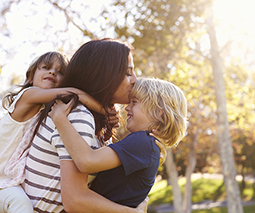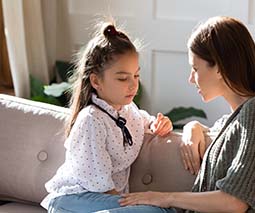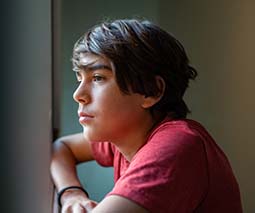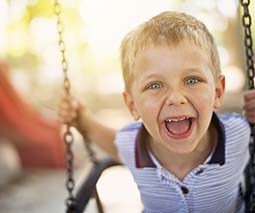The parenting mistakes having a long-term impact on our kids

We’re always being told how to parent and what’s best for our kids, but it’s important to look at the bigger picture. Jonathan Haidt, social psychologist, Professor of Ethical Leadership at New York University and author of The Coddling of the American Mind explains the changes that have happened when it comes to parenting and what effect this has had on our kids.
Listen to Jonathan Haidt on Feed Play Love:
What went wrong?
According to Jonathan, there’s a mental health catastrophe unfolding in the USA, Britain and Canada. “What we argue in our book, based on studying a variety of possible causes, is that the two things are messing up Gen Z, that is kids born in 1986 and after. The first is vast over protection,” he says. “In America, we literally stopped letting kids go outside without supervision. By the early 2000s in America, nobody had seen a child unaccompanied for so long that if a child was seen playing in a park, the parents could be arrested; we grossly overprotect our kids and deprive them of basic learning experiences of independence.”
The danger of social media
The second major factor is letting kids go on social media far too early. Like any parent, Jonathan struggles with the use of devices, but data has shown him that screen time is not the issue. “It’s social media, and it’s for girls, that’s the problem,” he says. “When girls get on social media at about ten, eleven, twelve, thirteen, that’s when you find much higher rates of depression and anxiety for the heavy users.”
What is the outcome?
In 2014, a colleague of Jonathan’s informed him of unusual changes occurring on college campuses, a time when the students were entirely from Gen Z. “Students were demanding safe spaces and trigger warnings in case the teacher assigned a book that had some violence in it,” says Jonathan. “The students kept talking as though if they were exposed to certain ideas or books, they’d be traumatised.” According to Jonathan, these kids have not only been overly protected but also, unlike the millennials before them, were introduced to social media in high school. “We have a generation of kids born in 1996 and after, who are much more anxious and fragile,” says Jonathan. “We’ve protected them so much that by the time our kids go off to college, they’re not ready for it. They’re coming out very fragile and not ready to join the workforce either.”
Don’t blame Mum
Often when it comes to parenting mistakes, society is quick to point the finger at mothers. But according to Jonathan, behaviour genetic studies show that genes cause the traits of a kid and very little is caused by the shared family environment. “Kids are influenced by their childhood, but it’s not necessarily by their specific parents, it’s by the norms in the community,” he says. “So, the norms of the community just freaked out in the 90s and kids got the message not just from their parents, but from all parents and from the media, that the world is dangerous and if you’re outside someone will abduct you.”
“I think that takes a lot of the burden off the mothers because usually, we want to blame the specific mother of this specific child,” continues Jonathan. “This is a communal problem, and we have to all work together to raise kids who are strong.”
How do we change?
Jonathan advises researching ideas that will help give kids independence through websites such as www.letgrow.org. “It’s very hard to do this as one parent or one family,” he says. “It’s much easier if the school gives some guidance or if you have a group of parents who all agree.”
Jonathan also suggests setting boundaries for social media, such as removing all devices from the bedroom by a fixed time, at least half an hour before bedtime. “That means laptop computers, iPhones, iPads, everything has to be out. Otherwise, some kids will be checking, even when they wake up during the sleep cycle.” He also suggests that kids should not be allowed on social media until they are 14 or 15 years old, and if they do use social media that you make a time budget. “If you don’t make a time budget, that’s a hopeless battle because those devices were made by teams of psychologists who know exactly how to keep your kid on for eight hours a day.”
Jonathan is striving to counteract the effects of the past, and he is just starting to see the situation swing back the other way as more and more people learn of what’s happening, particularly to teen girls. “I’m going to try to get the American Association of Paediatricians to make a clear statement that nobody should be on social media until they’re 15 or 16 years old – we should not be having 11-year-old kids on Instagram,” says Jonathan. “I think the pendulum will swing back, I don’t see it really just yet, but boy, I’m pushing as hard as I can.”
Find more great stories and expert advice in the Feed Play Love podcast. Available in Apple Podcasts, Google Podcasts, Spotify or wherever you listen.









